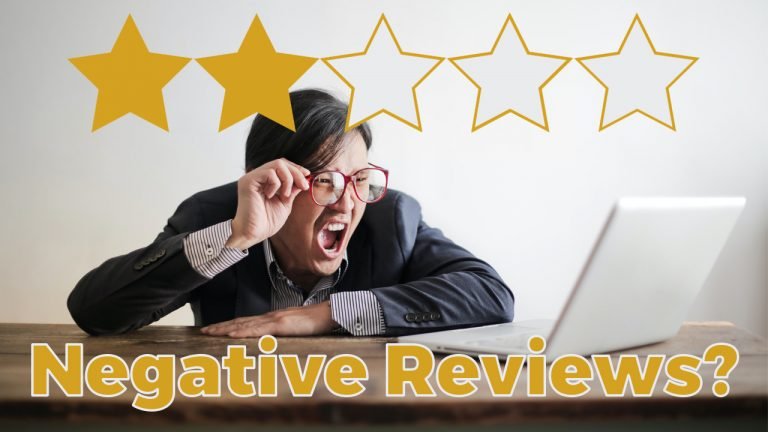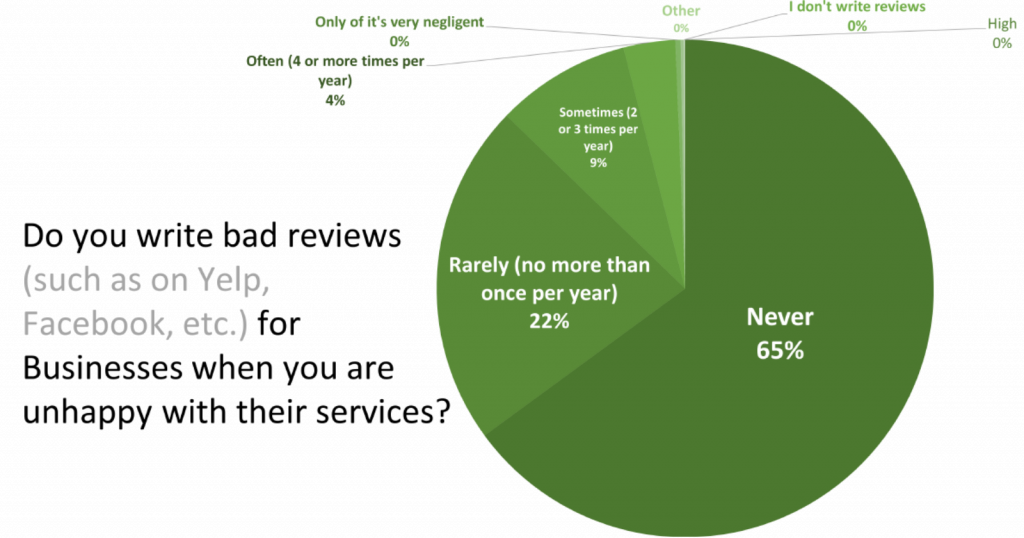
Bad reviews can be beneficial, especially when it comes to online reviews. Explore how negative reviews can actually help your brand.
You receive an email informing you of a new review.
After that, you take a deep breath and say a short prayer before opening the email.
You’re preparing for a negative review.
This is a common fear for business owners like you; as you know, a picture can say a thousand words – and so can a review (even with a character limit).
We know that consumers rely heavily on reviews when making purchasing decisions.
As a result, your first thought might be to put your best foot forward and avoid negativity like the plague.
However, there are times when bad is good.
Should I Get Rid of Negative Reviews?
You might be surprised, but negative reviews should not be deleted.
Negative reviews have a very positive impact on your brand, sales, and search engine result page (SERP) visibility, which may seem counterintuitive.
Can Negative Reviews Be Beneficial?
Yes! Bad reviews can be beneficial, especially when it comes to online reviews.
Why Is Some Negativity Beneficial in Online Reviews?
Surprisingly, having too many positive reviews can raise a red flag for customers.
According to a ReviewInc study, people will trust a 4.7 rating more than a perfect 5-star rating.
Customers are aware that some businesses “game,” falsify, or provide payment and exchanges for positive reviews.
Customers recognize when something appears to be too good to be true, and when this occurs, they frequently decide to take their business elsewhere.
Furthermore, the FTC has a lot to say about bribing customers for positive feedback and gaming the system (and what they have to say is not what you want to hear).
However, regardless of the platform, a good rating that includes negative reviews is a strong indicator of authenticity.
We know what comes next in your mind.
How Frequently Do People Leave Negative Reviews?
The good news is that negative reviews are not as common as you might think.
ReviewInc conducted a survey in 2022 and discovered that 65 percent of people do not leave negative reviews when they have a bad experience.
That is fantastic news!
It is also worth noting that there was no discernible gender difference; all genders reported an equal rate of avoiding writing negative reviews.
In other words, the likelihood of receiving a positive review outweighs the likelihood of receiving a negative review.
According to ReviewInc’s overall metrics, 92 percent of reviews are positive (and 96 percent of the positive reviews are 5-star ratings).
Less than 5% of the reviews have One-star ratings.

So, what are the specific reasons why negative reviews are beneficial to your business?
Let’s take a look at how bad reviews can actually help your brand.
How Negative Reviews Aid in SEO and Online Reputation Management
Your star ratings can be improved by leaving your negative reviews in place and managing them with online review management tools.
- Assist in improving your overall SEO and search visibility.
- Increase your customer base, trust, and loyalty.
- Give suggestions on how to improve your company for future growth.
Negative Feedback Offer Genuine SEO
Google search engine optimization rankings take into account reviews and ratings on sites such as Google, Facebook, and Yelp.
Google explains how reviews affect prominence in SEO rankings. According to the study, “good customer reviews can increase your business’s visibility and increase the likelihood that a shopper will visit your store.”
Encouraging and responding to all reviews is a good practice that will improve your local SEO and online reputation.
When it comes to negative reviews, they tend to provide a necessary balance, as an overabundance of fake “positive” reviews or biassed reviews can result in all of the reviews being suspended from a key review site, which will have a significant impact on SEO.
Regardless, don’t be concerned about a negative review; there is good news.
Negative reviews increase brand trust and loyalty.
Among these platforms, Yelp has the lowest average review score, at 3.65, Facebook, Google, and TripAdvisor have higher ratings on the other major platforms. “
While those figures, particularly on Yelp, may appear frightening, the truth is that reviews are trust-building mechanisms that help customers understand what they are getting into before purchasing.
In short, negative reviews are a necessary component of authenticity, which can lead to increased sales.
The trick is to elicit a sympathetic reaction, which will:
- Assist future customers in comprehending the context of a negative review.
- Demonstrate to potential customers that you understand their needs and will work to meet them.
- Demonstrate to reviewers that you care about them.
A previously negative reviewer may actually update their review to a higher star rating using this technique.
“When you respond to reviews, you post publicly as your business,” according to Google’s guidelines. It is possible that responses will not appear immediately on Google. When you respond to a reviewer’s review, they will receive a notification. They will be able to update their review once they have had a chance to read your response.”
How Should I React to Negative Reviews?
We understand that negative reviews can feel like bad news, but a well-crafted response can mitigate the impact.
Other customers can see how you respond appropriately to a negative review.
The way you handle the situation will be more important than the negative review. (Here are some suggestions for responding to a negative review.)
Responding to reviews demonstrates that a company is concerned about its service and reputation.
The response alone instills more trust in a company.
Negative feedback can help improve business operations and profits.
So, how about that one-star rating?
There is a genuine benefit to negative reviews and what they should be used for.
Negative reviews inform a company about what it needs to fix and improve.
In today’s competitive environment, this is especially important.
Criticism can sometimes help us improve as people and businesses.
If a customer has a negative experience and leaves a review, it will bring to your attention an issue that you may not have noticed:
- Is there a faulty item?
- Is a team member in need of direction?
Not all negative reviews necessitate the closure of a business; instead, they can be used to improve and strengthen customer service.
How to Keep Track of All Your Reviews
Because of the importance of online reviews and star ratings, an online reputation management strategy is required.
It is critical to monitor your reviews, promote more reviews, and have a strategy in place to respond to all reviews.
After all, your response could persuade a negative review to become a positive one.
This strategy will improve a company’s reputation as well as its SEO.
Businesses can have a team overseeing their online reputation and all reviews left with reputation management software.
A good service will also provide tools to help you compose and manage responses.
The software enables your business team to respond quickly and appropriately, relieving you of the stress of negative reviews.
